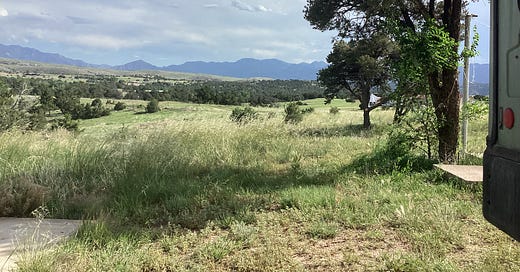The Emotion Without a Name
Exploring the unexplainable tenderness in moments of quiet connection
I’m not sure how to begin this. Some ideas arrive fully formed, easily shared. Others—like this one—hide in the folds of your heart and resist translation. But maybe that’s the point.
A few months ago, I went to my sister’s school open house, an event they call Coyote Days. Her 4th grade class had transformed their room into a scene from the 1800s—an old-time saloon with poker tables and faux mustaches. As I walked through, I noticed one girl seated alone at a card table, a quiet dealer with no one playing. She sat there, staring into the distance, maybe slipping between character and real life. I stopped and asked her about the game. She lit up—her whole body changed as she leaned forward to explain the rules, her voice taking on a kind of importance, a sense of being seen.
It was a small moment. And yet, when I tried describing it later to someone else, I found myself overwhelmed with emotion. My throat closed, my eyes welled up. Even now, writing about it brings tears. It reminded me of similar moments with my daughters when they were younger—tiny, fleeting moments of connection that seem to echo somewhere deep and old inside of me.
Why do we cry in these moments? Not from sadness. Not quite from joy either. It’s something else. Something older.
Most emotions are easy to trace back to the self. Fear is protective. Anger defends. Jealousy signals perceived scarcity. Even love, in many cases, can be explained through evolutionary advantage—partnership, community, reproduction. But this feeling—this sudden bursting up of tears when we brush up against a tender connection or witness someone becoming more themselves—it feels like it doesn’t belong to just me. It’s as if I’m tapping into something shared, something collective and yet personal.
This is the part I can’t quite name.
It’s not just nostalgia, although it feels like longing. It’s not just love, though it moves with the same gravity. It’s not just empathy, though it sees the other clearly. It’s as if some ancient part of us recognizes something in those rare moments—a re-alignment, a clarity. We glimpse the fragile miracle of being human and it stuns us.
These moments don’t serve the ego. They don’t elevate status or offer security. If anything, they undo us. They break us open just long enough to remember that we were never meant to go through this life numbly. We were meant to feel it.
Is this what we’re all secretly starving for? Not money. Not praise. But a chance to be seen and to see, deeply—even just for a second. Maybe that’s why the emotion feels so rare. Because it shows up only when everything else drops away: when time slows, when performance pauses, when connection becomes the only thing that exists.
It feels sacred.
We often talk about purpose in terms of achievement, productivity, or legacy. But what if part of our purpose is simply to witness and be witnessed in this quiet, unnamable way? What if these fleeting, inexplicable moments are what actually sustain us?
I wonder, too, what this means for society at large. We live in a culture that rewards control and clarity—things we can define and monetize. But the most important parts of being human remain unmeasurable. We don’t have words for the look in a child’s eyes when they feel important. We don’t have metrics for the feeling you get when someone finally gets you after years of trying to explain yourself.
And because we can’t measure it, we undervalue it. We rush past it. We fill the silence where it might have grown. But what would a world look like if we didn’t? What if education, politics, community—all of it—was built not just on facts and logic, but on a reverence for the emotional truth that lives between people?
Maybe this emotion—whatever it is—is a compass. Not pointing forward, but pointing inward. It reminds us who we are, beneath everything we’re told to be. It shows us what we miss when we move too fast, and what’s possible when we don’t.
I don’t know its name. I’m not even sure we’re meant to name it.
But I know it when I feel it. And I know it matters.




